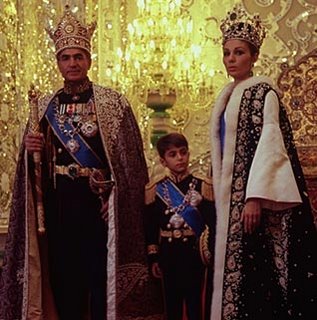Separate peace
Farouz Farzami in the WSJ: Killing time the other day on my way to meet my boyfriend, I walked through the long narrow passages of the House of Artists in the vicinity of the old U.S. Embassy, when I came upon a graceful exhibit of books published in America.And you wonder why Iranians had an Islamic revoltion--the rich in that country have always been part of the problem, no matter what the regime.
The books had been imported by a company called Vizhe Nasher ("special publication"), which is authorized, as it must be, by the government. Most concerned the visual and architectural arts, photography, sewing and cooking, and there was a wide variety offering weight-loss techniques, but I came across one I was startled to find: "The Daily Cocktail: 365 Intoxicating Drinks," by Dalyn A. Miller and Larry Bonovan.
I live in a country where alcohol is officially banned, but where the art of homemade spirits has reached new heights. Sharing my astonishment about the cocktail book with some friends with better connections to the Islamist regime, they explained the government has a silent pact with the educated and affluent in Iran's big cities, who render politics unto Caesar, provided that Caesar keeps his nose out of their liquor cabinets.
In other words, the well-to-do Iranian drinks and reads and watches what he wishes. He does as he pleases behind the walls of his private mansions and villas. In return for his private comforts, the affluent Iranian is happy to sacrifice freedom of speech, most of his civil rights, and his freedom of association. The upper-middle class has been bought off by this pact, which makes a virtue of hypocrisy.
The only difference is now they have to be underground; they wanna overthrow the current government not because of things like human rights abuses and an egregious foreign policy, but so they can go back to running the country and doing whatever they want whenever they want and to whomever they want.
They don't care about their own people--it's just like the rich Cuban exiles in Miami. They never talk about how when they ran the country it was under a dictatorship; they don't talk about how they hope to bring back free speech and democracy because they never had or wanted that.
It's all about the evils of the current regime, of which there are a lot--but you know, at a certain point you've got to come clean and admit it wasn't paradise that was lost, it was just your money, which was often ill-gotten at best, stolen at worst.
Caught in the middle, of course, are the poor who still suffer in the country, who hate the current regime but also remember that they hated even more the plutocracy. At least the current regimes in Iran and Cuba started out idealistic, with aspirations of change and a concept of social good.
The rich Iranians and Cubans merely want to feed.
Time/Life-Getty Images photo of the shah and his family by Dmitri Kessel and via PBS' Wideangle. More unbiased views on the Shah here.

No comments:
Post a Comment